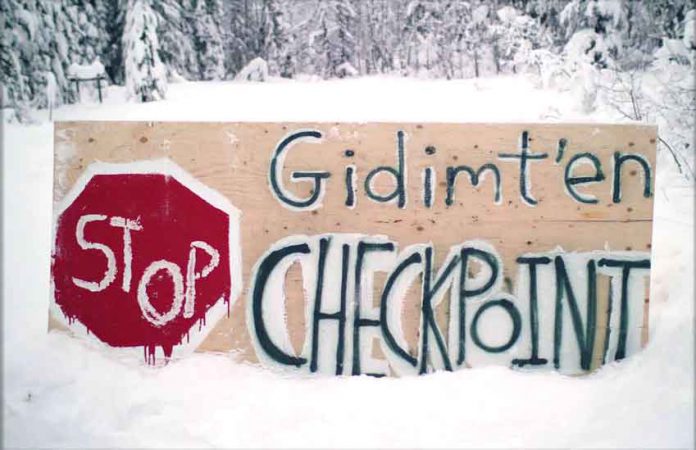Houston, (BC) – The Gidimt’en Clan condemns the arrest of a Gidimt’en elder at the RCMP checkpoint at 27km on the Morice Forest Service Road on unceded Gidimt’en territory. Carmen Nikal, 73 years old, has been an adopted member of the Gidim’ten Clan’s Cas Yex house for over four decades.
Late Friday, Carmen Nikal was arrested after refusing to provide identification when traveling as a passenger to Cas Yex territory through the RCMP’s unlawful checkpoint. She has since been released without charge.
RCMP refused to provide reasons for stopping the vehicle en route to Cas Yex territory, and cited violations of the Motor Vehicle Act. Carmen Nikal was a passenger in the vehicle and therefore was not lawfully required to identify herself to police.
Although the RCMP has stated publicly that they will “stand down” while talks between Wet’suwet’en Hereditary Chiefs and the Province advance, RCMP continue to conduct daily “patrols” on Gidimt’en territory and to harass and surveil our members and supporters. Police maintain an illegal checkpoint that has arbitrarily limited access to lawyers, media, supplies, and Wet’suwet’en people. RCMP has refused repeated requests from the Wet’suwet’en Hereditary Chiefs to dismantle the Community Industry Safety Office – a remote detachment built on Gisday’wa house territory without consent.
We are alarmed that as discussions are ongoing to advance peaceful outcomes, a large force of police officers are being deployed from throughout the Province to Wet’suwet’en territory. Good faith discussions between the Wet’suwet’en and the Province cannot occur while we are under duress, and while our families and guests face the threat of police violence. The Province has yet to consider any alternative to the forceful invasion of our territory and removal of Wet’suwet’en people from our land.
The position of the Wet’suwet’en Hereditary Chiefs remains the same:
-
We have not and will not provide free, prior, and informed consent to the CGL pipeline project. We require free, prior, and informed consent for any industrial use of our lands.
-
The RCMP must vacate our territories immediately, removing their remote detachment and the unlawful exclusion zone at 27km on the Morice Forest Service Road. RCMP presence has restricted the movement and access of Wet’suwet’en people and our guests to our own territories, infringing on our human and Aboriginal rights.
-
The RCMP must stand down and refrain from enforcing the injunction order.
-
nation-to-nation talks must occur with the provincial and federal leaders to address infringements to Wet’suwet’en rights and title.
-
The RCMP must not forcibly evict Wet’suwet’en people or our guests from our lands, must not deploy any lethal weapons or force, and must not threaten the apprehension of our children.
We urge the Province to require that police stand down so that meaningful dialogue can occur to advance peaceful outcomes on our territory, and to ensure the safety of Wet’suwet’en people and guests who currently face the immediate threat of police violence. Today’s arrest highlights the abusive conduct and overbroad interpretation of the injunction order that RCMP are using to criminalize Wet’suwet’en people on our own lands.
We mirror the complaints filed jointly by our Hereditary Chiefs, the BC Civil Liberties Association, and the Union of BC Indian Chiefs, who expressed: “We have serious concerns about the overbroad scope as well as an inconsistent and arbitrary exercise of RCMP discretion in Wet’suwet’en territories. The RCMP implementation and enforcement of the exclusion zone criminalizes and impedes the movement of Wet’suwet’en people, invited guests of the Wet’suwet’en, media, legal counsel as well as food and medical supplies. RCMP interference with individual liberty is significant, arbitrary, and disproportionate to achieving the stated goal of public safety. Further, the RCMP checkpoint and exclusion zone is in clear violation of constitutionally recognized Anuk‘nu’at’en (Wet’suwet’en law) as well as the Canadian Charter of Rights and Freedoms.”
In this era of reconciliation, and as is required by BC’s own UNDRIP legislation, the Province must respect Wet’suwet’en rights and title on unceded Wet’suwet’en lands.


